|
(9:30 min read)
Digital marketing is becoming more complex; lines between marketing and IT are blurring; in the midst of it all, we're faced with a looming digital marketing skills gap. This article provides background and 5 strategies for businesses to effectively tackle digital marketing and build their own highly effective digital marketing team, whether it's in-house, outsourced or a combination of different options: 1. Build a Digital Marketing Team Internally 2. Upskill Existing (traditional) Marketing Staff 3. Manage Your Agency Relationship/s As Best As You Can 4. Hire a Full Time Digital Marketing Manager 5. Outsource or Contract Services Bridging the Digital Marketing Skills Gap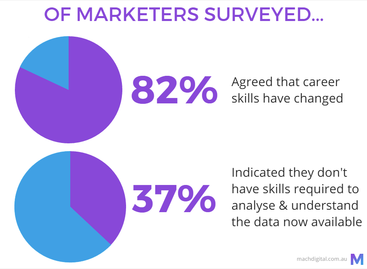
Digital marketing moves fast.
How many features do you use online today or see in Google search results that you didn't use 5, 2 or even 1 year ago? It's no surprise that marketers are having trouble keeping up. A number of sources are predicting a digital skills gap in the near future. 5 years ago, Gartner forecasted that by 2017 CMOs would be spending more on IT than CIOs (such is the requirement for analytics software, reporting tools, automation and personalisation software and more). It looks like the prediction might come true this year. So, where does this leave marketers and businesses? It means (at very least) that your marketing manager is going to need some help, and soon. Which Digital Skills? Where to Start?
There is a broad range of skills these days that fall under the umbrella of 'digital marketing'.
A couple of our favourite graphical representations of these are below: 1. The graphic below from Unbounce titled 'The Noob Guide to Online Marketing' gives a great representation of the scope of tasks involved and current 'digital marketing' skill set.
2. The one below from Gartner is one of our personal favourites that shows how Digital Strategy is interconnected, represented as a subway map, built from real data taken from over 1,800 businesses.
In-House Vs Outsourcing: Start with Your Core Strategic Goals
It's the million dollar question - in-house Vs outsourcing?
The truth is that there are pros and cons to both of these arrangements. But before we deep dive into the different strategies available, it's worth starting at the core of your strategy. Your business' core strategic goals should form one of the main deciding factors on whether you outsource or build/hire the resources in-house, where you start and how heavily you invest into each area. For example -
Core competencies and focus of your digital strategy can be guided by:
Now to our 5 strategies... Strategy 1: Build an Internal Digital Marketing Team
Team Roles
As the Gartner Map above illustrates, there are key areas or 'zones' of digital marketing skills to narrow in on. For the purpose of this article, let's assume we're building a smaller cross-functional team of 3-5 staff at an SMB level (rather than a specialised or enterprise level team focused on one of those digital marketing 'zones'). A typical 5-person cross-functional digital marketing team ('pod') could consist of the following roles:
There might be overlap between some of the roles depending on particular skill sets. I.e.: Your social media manager might also be skilled at content creation, in which case you might consider subbing in a designer or UX specialist (as an example). Hubspot suggests an example 5 person pod structure for "an agency that works with small businesses and does a lot of website redesigns" as:
Larger organisations may still start with this core structure, but expand by create additional roles and teams based around functions and objectives - for example, teams specifically built around acquisition, growth, engagement or retention/loyalty.
The key consideration for any cross functional team is that the team should have all the skills required to complete the project*
* the cross-functional team could be made up of a combination of internal and external resources - see section 5 on outsourcing or contract services.
Team Structure
Principles of Scrum suggest that an optimal size for a cross functional team (or 'pod') is between 3-7 staff and no more than 9 staff. Research suggests that communication significantly declines past this number.
Hubspot takes this a step further and suggests two different 'pod' configurations for a cross functional, 'growth driven design optimised team' - one of 3 staff and one of 5 staff which also keeps an inbound marketing skill set in mind:
Image credit: Hubspot.
Strategy 2: Upskill Existing Marketing Staff
For smaller businesses with a more restrictive budget, or where there is a strong opportunity to upskill existing 'traditional' marketing staff, there are a number of resources online, both free and paid, which can make this a good option.
Due to the fast moving nature of digital marketing, these online resources from reputable organisations are often kept more up to date than offline sources. Where to get started upskilling?
Strategy 3: Manage Your Agency Relationship(s) as Best as You Can
Working with a good digital agency can be a highly rewarding experience and even feel like working with members of your own team, all whilst proving more cost effective and less risky than hiring the same full time resources in house.
Then, some other times, things don't go so well... There are some key considerations to keep in mind when working with a digital agency that can help you achieve great outcomes together: Be Prepared
If choosing a digital agency...
Know What to Expect
Strategy 4: Hire a Full Time Digital Marketing Manager
For organisations with larger budgets, hiring a full time digital marketing manager can be a worthy option to either:
1. Lead an internal digital marketing team 2. Manage the relationships with your existing agency/s 3. Do a bit of both Again, this can be very much a case of 'you get what you pay for' in terms of skills and depth of experience. A quick aside - take Care When Hunting Unicorns Remember the Gartner transit map at the start of this article? If you're hoping to find a real person with a full skill set like that (who isn't lying to you), you could be searching for a long time. Strategy 5: Outsource or Contract Services
This can be one of the most agile and flexible solutions. In some ways, it can even be a combination of all 4 options above.
Once you've decided on the requirements for your core competencies, your goals and budget - engaging with a professional for a flexible hours agreement can give you the extra punch you need, just when you need it, to ensure that things are getting done right and you're not wasting money.
Some of the best ex-staff are out there running their own consultancies, broken free from the agency world and brimming with knowledge from both sides of the fence. A good digital marketing professional can:
In Conclusion
There are a number of effective strategies for building a highly successful digital marketing team in 2017 and beyond. Which is best really comes down to your business needs and budget.
Here's a quick checklist:
Be sure to prioritise and remember that you can use a combination of strategies to spread your risk rather than going 'all-in' in any one area. We hope this article is useful and would love to hear feedback or any other points from your own experience.
2 Comments
(3 min read)
The start of each new year these days hails the inevitable onslaught of predictive online posts of trends for the year ahead. There are few, however that hold as much weight as the 2017 Digital Trends Report from Econsultancy in association with Adobe. Published in February 2017, this year's report is based on a survey of more than 14,000 digital marketing and ecommerce professionals from across the globe. Below are some of our key takeaways from the report. Takeaway 1: Customer Experience Remains Key
22% of client-side respondents ranked 'optimising the customer experience' (CX) as the most exciting opportunity in 2017, ahead of 'creating compelling content for digital experiences' (16%) and 'data-driven marketing' (12%).
71% of respondents also considered 'optimising the customer experience' to be 'very important' for their digital marketing over the next few years. This topped the list ahead of 'ensuring consistency of message across channels' (66%), 'training teams in new techniques, channels and disciplines' (58%), 'understanding how mobile users research/buy products' (50%) and others.
A quick aside...
Defining 'Customer Experience' (CX) - How Is It Different to UX?
Takeaway 2: Navigating Data Still Presents Challenges
On the negative side, the report suggests that whilst marketing analytics are vital, organisations still seem to be struggling with data - especially bringing together offline and online data which is a goal for many organisations, though still presents one of the largest challenges.
Data capabilities in general don't seem to be developing fast enough to keep up, the report continues. It makes sense that if organisations' top priority is optimising the customer experience, then an appropriate investment in marketing analytics software and resources should be made to gain the necessary insights to understand those customers throughout the user journey." Takeaway 3: What Are the Top Priorities for 2017?
According to the report, marketers' priority wish lists for 2017 are topped by:
'Brand building', 'video content', 'customer journey management', 'multi channel campaign management' and 'search engine marketing' rounded out the top 8. Focusing on Customer Experience Excellence
Customer Experience (CX) continues to appear as top priority on these types of reports and lists as we move into 2017.
Then how do we move towards Customer Experience Excellence? (...CXX?) It's important above all else to consider that the responsibility for customer experience in an organisation is not the role of one individual or department, it is everyone's responsibility. Excellent customer experience permeates the entire company's culture - right from the CEO to the sales team and through to the customer service desk and across all touch points. Master Your Culture, Master Your Customer Experience It's interesting on this note that 'Culture' was second on the list of 'elements of customer experience that organisations found most difficult to master' (second only to 'Strategy') - in fact, 14% of respondents rated 'Culture' as 'most difficult' to master. It would seem then that 'Culture' is the logical place to start. Have a clear vision and purpose, then live it and breath it.... the rest will start to flow from there.
You can download a full copy of the 2017 Digital Trends report from Adobe's website. There is also a 3 part webinar series running from 28 Feb 2017.
|

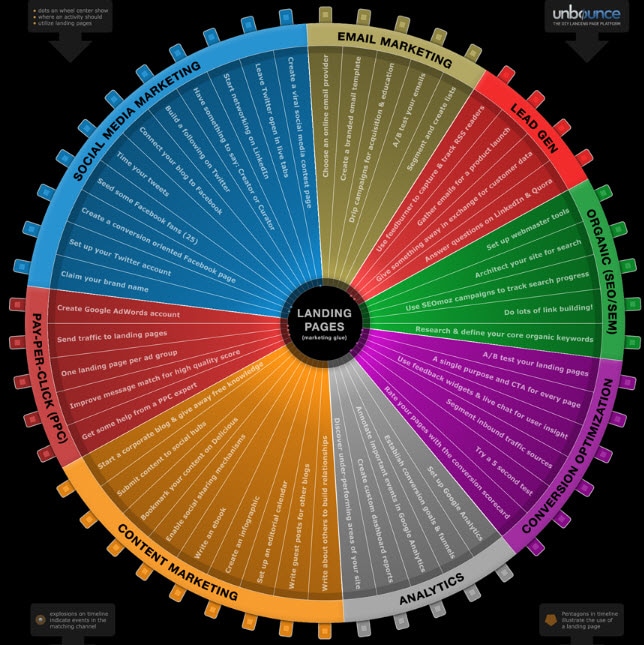
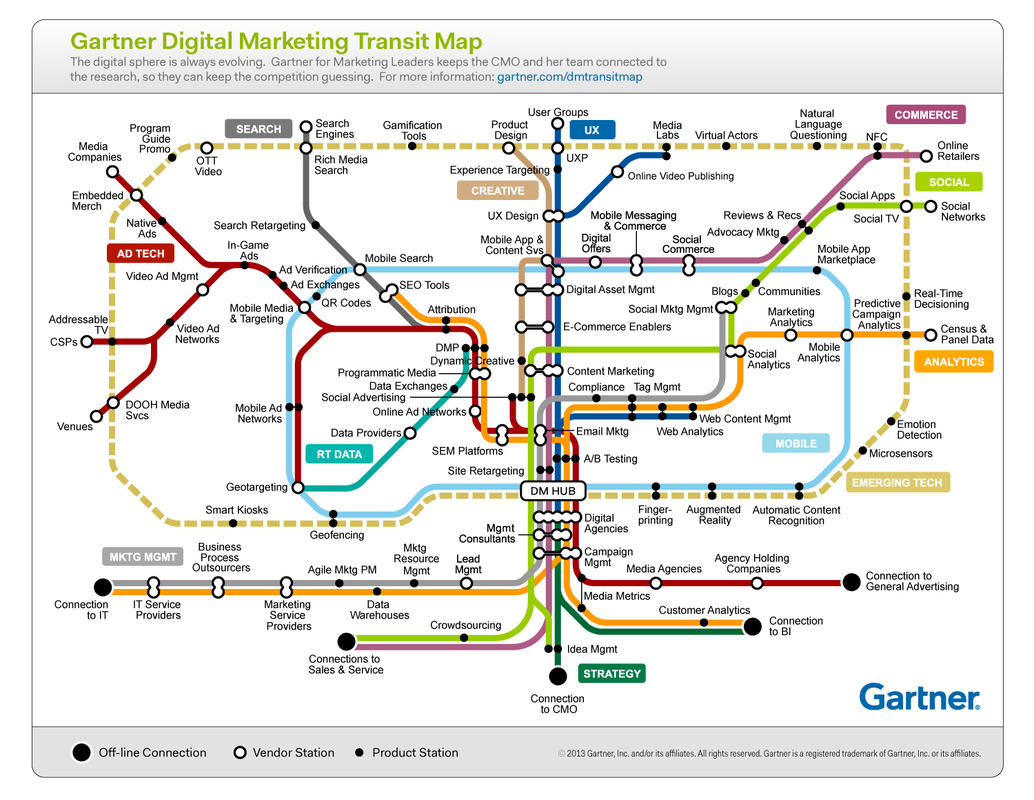
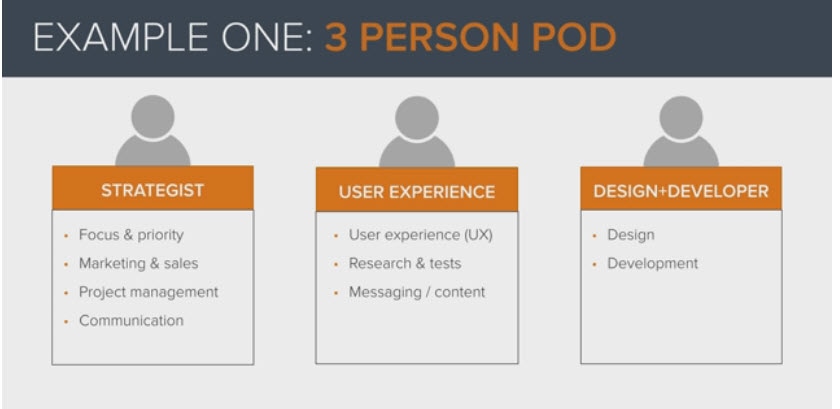
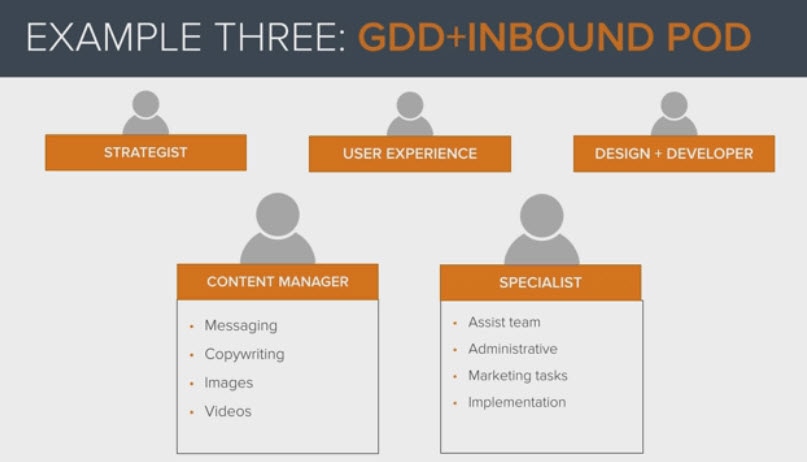


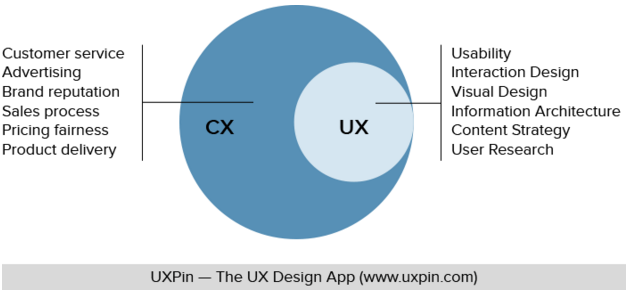
 RSS Feed
RSS Feed
